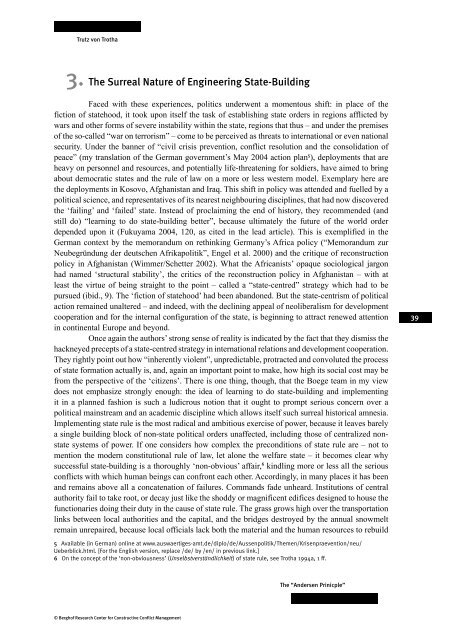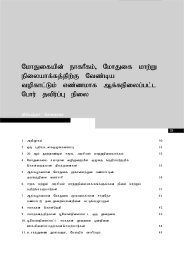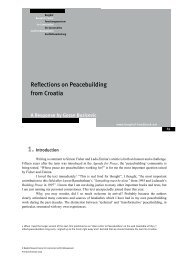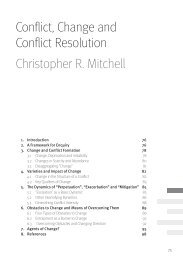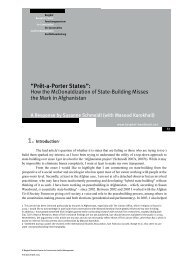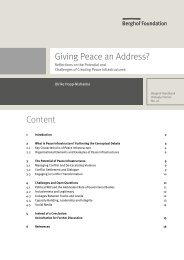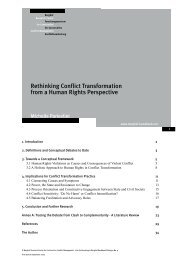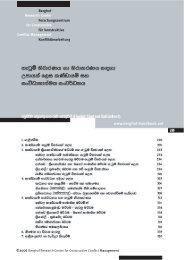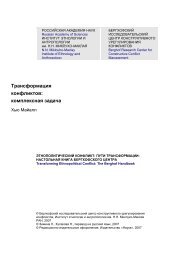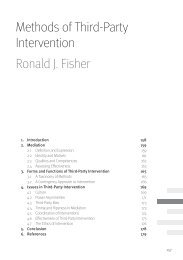Andersen Principle - Berghof Handbook for Conflict Transformation
Andersen Principle - Berghof Handbook for Conflict Transformation
Andersen Principle - Berghof Handbook for Conflict Transformation
You also want an ePaper? Increase the reach of your titles
YUMPU automatically turns print PDFs into web optimized ePapers that Google loves.
Trutz von Trotha<br />
3. The Surreal Nature of Engineering State-Building<br />
Faced with these experiences, politics underwent a momentous shift: in place of the<br />
fiction of statehood, it took upon itself the task of establishing state orders in regions afflicted by<br />
wars and other <strong>for</strong>ms of severe instability within the state, regions that thus – and under the premises<br />
of the so-called “war on terrorism” – come to be perceived as threats to international or even national<br />
security. Under the banner of “civil crisis prevention, conflict resolution and the consolidation of<br />
peace” (my translation of the German government’s May 2004 action plan 5 ), deployments that are<br />
heavy on personnel and resources, and potentially life-threatening <strong>for</strong> soldiers, have aimed to bring<br />
about democratic states and the rule of law on a more or less western model. Exemplary here are<br />
the deployments in Kosovo, Afghanistan and Iraq. This shift in policy was attended and fuelled by a<br />
political science, and representatives of its nearest neighbouring disciplines, that had now discovered<br />
the ‘failing’ and ‘failed’ state. Instead of proclaiming the end of history, they recommended (and<br />
still do) “learning to do state-building better”, because ultimately the future of the world order<br />
depended upon it (Fukuyama 2004, 120, as cited in the lead article). This is exemplified in the<br />
German context by the memorandum on rethinking Germany’s Africa policy (“Memorandum zur<br />
Neubegründung der deutschen Afrikapolitik”, Engel et al. 2000) and the critique of reconstruction<br />
policy in Afghanistan (Wimmer/Schetter 2002). What the Africanists’ opaque sociological jargon<br />
had named ‘structural stability’, the critics of the reconstruction policy in Afghanistan – with at<br />
least the virtue of being straight to the point – called a “state-centred” strategy which had to be<br />
pursued (ibid., 9). The ‘fiction of statehood’ had been abandoned. But the state-centrism of political<br />
action remained unaltered – and indeed, with the declining appeal of neoliberalism <strong>for</strong> development<br />
cooperation and <strong>for</strong> the internal configuration of the state, is beginning to attract renewed attention<br />
in continental Europe and beyond.<br />
Once again the authors’ strong sense of reality is indicated by the fact that they dismiss the<br />
hackneyed precepts of a state-centred strategy in international relations and development cooperation.<br />
They rightly point out how “inherently violent”, unpredictable, protracted and convoluted the process<br />
of state <strong>for</strong>mation actually is, and, again an important point to make, how high its social cost may be<br />
from the perspective of the ‘citizens’. There is one thing, though, that the Boege team in my view<br />
does not emphasize strongly enough: the idea of learning to do state-building and implementing<br />
it in a planned fashion is such a ludicrous notion that it ought to prompt serious concern over a<br />
political mainstream and an academic discipline which allows itself such surreal historical amnesia.<br />
Implementing state rule is the most radical and ambitious exercise of power, because it leaves barely<br />
a single building block of non-state political orders unaffected, including those of centralized nonstate<br />
systems of power. If one considers how complex the preconditions of state rule are – not to<br />
mention the modern constitutional rule of law, let alone the welfare state – it becomes clear why<br />
successful state-building is a thoroughly ‘non-obvious’ affair, 6 kindling more or less all the serious<br />
conflicts with which human beings can confront each other. Accordingly, in many places it has been<br />
and remains above all a concatenation of failures. Commands fade unheard. Institutions of central<br />
authority fail to take root, or decay just like the shoddy or magnificent edifices designed to house the<br />
functionaries doing their duty in the cause of state rule. The grass grows high over the transportation<br />
links between local authorities and the capital, and the bridges destroyed by the annual snowmelt<br />
remain unrepaired, because local officials lack both the material and the human resources to rebuild<br />
5 Available (in German) online at www.auswaertiges-amt.de/diplo/de/Aussenpolitik/Themen/Krisenpraevention/neu/<br />
Ueberblick.html. [For the English version, replace /de/ by /en/ in previous link.]<br />
6 On the concept of the ‘non-obviousness’ (Unselbstverständlichkeit) of state rule, see Trotha 1994a, 1 ff.<br />
© <strong>Berghof</strong> Research Center <strong>for</strong> Constructive <strong>Conflict</strong> Management<br />
The “<strong>Andersen</strong> Prinicple”<br />
39


